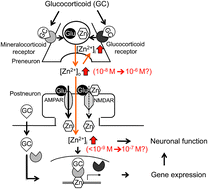Proposed glucocorticoid-mediated zinc signaling in the hippocampus
Abstract

- This article is part of the themed collection: Metals and Genetics
* Corresponding authors
a
Department of Medical Biochemistry, School of Pharmaceutical Sciences, University of Shizuoka, Global COE, 52-1 Yada, Shizuoka 422-8526, Suruga-ku, Japan
E-mail:
takedaa@u-shizuoka-ken.ac.jp
Fax: +81-54-264-5705
Tel: +81-54-264-5700

 Please wait while we load your content...
Something went wrong. Try again?
Please wait while we load your content...
Something went wrong. Try again?
 Fetching data from CrossRef.
Fetching data from CrossRef.
This may take some time to load.
Loading related content
